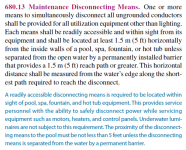And there's the kicker! Why does this stuff have to be so vague? I operate a bbq concessions trailer and am always dealing with the health department in various locations. They all say they follow the same code, but no two of them can agree on ANYTHING. I can pass an inspection this week and fail one the next, just one county over. It's frustrating to say the least.
And that is the real issue, so much of it is open to interpretation and what the local building officials determine. And the health stuff too. I used to do an Oktoberfest event for my Rotary Club. The same inspector using the same code would change things year to year. I used to run the beverage operations. Dealing with the State ABC for permits is a nightmare and needed months of lead time, since my wholesaler will not sell to me unless I had the right permits (unless they risk having their alcoholic beverage wholesaler permits pulled)
Like I said, my Brother In Law is an electrician, and not some guy that barely got his license and is making a living plugging and switching new construction. He owned his own business for a while, he did lots of residential work as well as about 30% of his business being commercial accounts including large warehouses, entertainment venues, etc.
I was in the middle of my hot tub install, and I had a bond halo around it (still exposed) and the conduit and disconnect in place (which was actually placed by an other electrician I hired - yes, I have an electrician in the family but I hire out electrical work to other people, its a long story). He looked at it and said "You know, you don't need that bond halo or that disconnect". I said I know about the halo, but the disconnect is in the NEC, which my town uses. He said nope, they are interpreting that differently now, and as long as there is any way to disconnect power, you are good. It does not have to be line of sight.
We talked a little about it, and my argument was it is for serviceability - a technician can be working on the tub and they can see if somebody is going to energize it. He said, so if I put this disconnect inside a shed 45 feet away where you can see it through the window, does that meet the code. If the technician is under the tub, working on the unit, how is he going to see if somebody in the shed turns the power on. If it is for service safety it should have a LOTO on it instead. That is why they are interpreting the code differently now.
So, that is what he said. I can't say it does not make some sense. I don't know if it is just this area, or more widespread. I have a friend who is the retired lead electrician for Giants Stadium, and he is now the township inspector for about 6 towns in the Bergen / Hudson County area. A lot of towns around here do that - use the same person, so I can see that if he changes his mind on something, then a lot of towns all of a sudden change their interpretation.
I still put the disconnect in because to me, it makes sense, it was cheap (It's cheaper to buy the enclosure with a GFCI breaker, than it is to buy just a GFCI breaker by itself for the panel) and I use it when I am draining and refilling the tub.
I did not realize that you live in Missouri. Not only does Missouri not adopt the NEC as a state code, but they also have no licensing for electricians. Most States have some sort of State level licensing board for electricians, but not Missouri. You want to call yourself a electrician in Missouri? *poof* you are an electrician. It's crazy.
Licensing and certifications are a strange thing. I looked into them when I was thinking about actually getting my PE (I went as far as an EIT and then changed job duties).
If you want to be a Registered Contractor in NJ you need to fill out a form certifying you have liability insurance, know some rules (about written contracts and displaying your name), and pay $110. Then you become a Registered Contractor. What does that mean? It means you can do any sort of contracting work you want (that does not need a separate license like electrical or plumbing) but you cannot offer financing.
Oh, you want to offer financing (of more than 90 days) to your customers - then you need to be a Licensed Contractor. How do you do that you ask? You get a licenses, from the Department of BANKING AND FINANACE. Nothing to do with the actual contracting work you do, just that you know how to put together a loan.
Ah, that was a rant about licensing, permitting, and general government confusion in general. Sorry for the long winded post, it's an annoying subject. If you really want to get into something, we can talk about trying to register a trailer in NJ with the DMV when the trailer was not previously registered. That makes you want to put your head through the wall.



